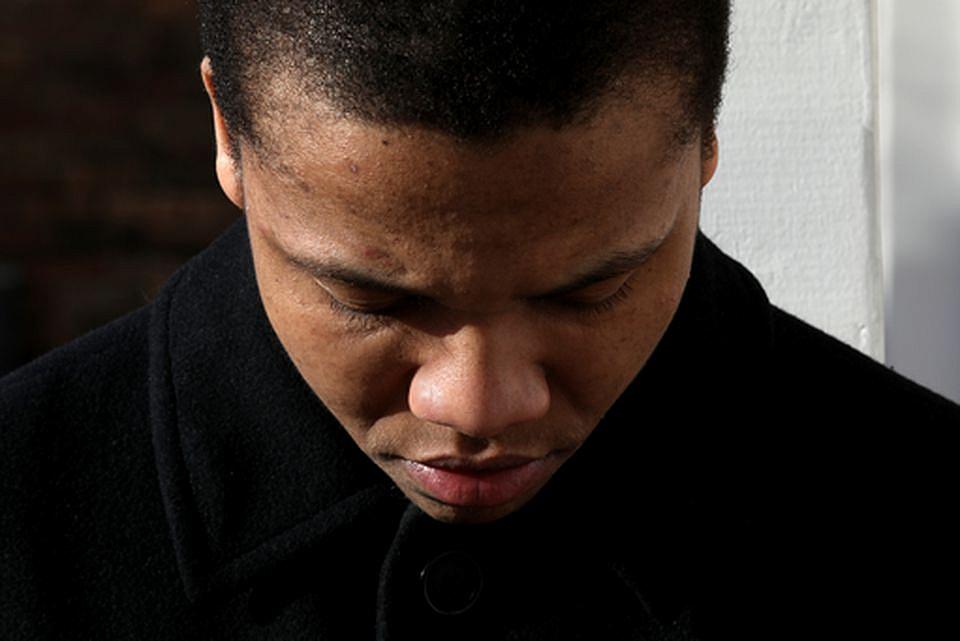Healing through our reflections: Dear Cleveland
This story was produced as part of a larger project led by Rachel Dissell and Brie Zeltner, participants in the 2018 National Fellowship.
Other stories in this series include:
Dear Cleveland: Six young women capture their city – the bad as well as the good – in photos
Dear Cleveland: Photos by Air Rodgers, 16
For Audrey, ‘wanna hang’ is a question with no good answer
’Achieve’ captures obstacles, aspirations of three young men growing up in Cleveland: Dear Cleveland

(Lynn Ischay/The Plain Dealer)
Cleveland, Ohio -- Patrick Warner has been putting his heart into rhymes since he was 13.
At 17, he turned to music to deal with the death of his ill father, and the loss of a best friend to violence a month later.
It was where he found refuge when a music mentor died in 2016, and last year, when he lost his beloved Aunt Anna, who always stepped in to support him in any way he needed.
“Music has always been my voice, my way of trying to understand life,” Warner, who lives in Cleveland’s Buckeye-Shaker neighborhood, said. “I would write the things I was afraid to say.”
Heal myself through my reflection
More than rap, really it’s just my confessions
On a track, I’m in a fight with my depression
Music has motivated the 22-year-old to work through bouts of depression, and, he says, to realize that life is fragile, but worth living.
It’s one of three songs created during a workshop with Refresh Collective, a non-profit that promotes youth voices on community issues through music and a clothing line. Click on the links below to learn about the other two songs, “This and That” and “Achieve.”
Warner started out as a participant and now works with younger kids and teens, during summer camps or in-school residencies. (Watch Warner talk more about his music in a video below.)
Since 2011, tracks recorded by students have tackled gun violence, food deserts, racism and suicide. Verses also reflect how young people want to be viewed, and the changes they’d like to see in their communities.
Refresh Collective is one of a growing number of programs, in Cleveland, and elsewhere, filling a gap created by the shrinking of arts and creative arts programs in schools driven to devote more time to core academics and standardized testing.
Other area programs include Notes for Notes at the Boys & Girls Club of Cleveland and FreshLo One Garden Valley.
For young people these opportunities can create a framework to flesh out their feelings and speak to a world that often misunderstands and criticizes them.
When The Plain Dealer first shared in a story last spring that creating hip-hop and rap songs was part of our Dear Cleveland project, along with taking photos and writing short stories, some readers called and posted comments online preemptively lodging criticism based on young people’s attire — hoodies — and the choice of genre.
The young people appeared to shrug that rhetoric off. They were used to being judged and misunderstood, they said.
Maurice Philpott Jr., who goes by the name Los P. and has released dozens of songs under that name, said for young black men in Cleveland, it’s a constant battle to define who you are and not to let others do it.
“Judging a person,” he said. “Can break somebody down terribly.”
But the criticism rang especially hypocritical in a town where music is worshiped at a temple on the waterfront.
At the Rock & Roll Hall of Fame, hand- and typewritten-lyrics live on behind glass, revered by those craving a glimpse into the psyche of legends, like John Lennon.
You can see edits to “Yer Blues,” which Lennon recorded in 1968, the word suicidal added in black marker.
Black cloud cross my mind
Blue mist ’round my soul
Feel so suicidal
Even hate my Rock n’ Roll
A placard that accompanies the lyrics explains that the song originally was viewed as a parody of a burgeoning British Blues scene but is now recognized as a representation of the pain the musician was in after the death of his manager and as his band, The Beatles, disintegrated.
Clarifying thoughts
The young people who gathered to write and record songs this summer in Refresh Collective’s Superior Avenue studio, spoke about how the process of putting words to beats clarified their thoughts, calmed them, got them through a loss, a disappointment or tragedy.
It also created a comfortable platform from which to confront the injustice and stereotypes that weigh heavily in many of their lives. And it served to ameliorate stress, thus fueling their resilience.
For Los P., that also means building confidence and filtering out those harmful opinions.
That doesn’t mean he sees poverty or growing up in an urban environment as an excuse for people to not achieve their goals, he said.
“You can always find control in your life,” he said. “You have to live, not let life live you.”
[This story was originally published by cleveland.com.]


